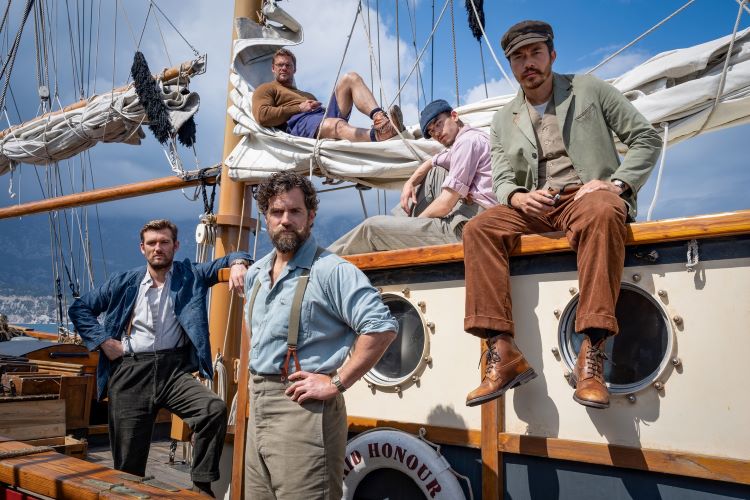
Incessant thrill-seeking, along with a denial of potential dire consequences and a conspicuous lack of empathy, may not be the qualities one seeks in a close friend or life partner, but in a time of war, and in Guy Ritchie’s new film, The Ministry of Ungentlemanly Warfare, these turn out to be incredibly useful characteristics in the making of heroes. Suspenseful and action-packed, the film scintillates with Ritchie’s flair for a sprinting pace spiked by comic panache and the occasional exquisite dissonance between Christopher Benstead’s jazzy score and overwhelming danger. All in all, wonderfully satisfying for the secret thrill-seeker within us all. The screenplay, penned by Paul Tamasy, Eric Johnson, Arash Amel, and Guy Ritchie, is inspired by real events during World War II, as depicted in the book The Ministry of Ungentlemanly Warfare: How Churchill’s Secret Warriors Set Europe Ablaze and Gave Birth to Modern Black Ops by Damien Lewis, and according to British War Department documents that were declassified in 2016.
The film is set in 1942, as a crew of rule-breakers is put together at the behest of Winston Churchill (Rory Kinnear) for a secret operation to get Britain out of a tight spot. German U-boats dominated the waters, submerged and undetectable, they were able to attack, yet were themselves, unassailable. A creative solution was to prevent the supply of fuel from reaching the U-boats, thus disabling them. The catch was that these supply ships were based on the Spanish island of Fernando Po, off the West African coast, which was officially neutral, and hence the need for a covert operation – unsanctioned, unofficial, and unauthorized. The real-life operation that took place was called Operation Postmaster, and knowing that at least some aspects of these outrageous events really happened magnifies the excitement, along with a frisson of vicarious transgression, as the bad guys become heroes.
Leading the crew is Gus March-Phillips (Henry Cavill), who is brought out of jail to meet with M (Cary Elwes) and Ian Fleming (Freddie Fox). Cavill is elegantly louche as March-Phillips, sporting an impressive handlebar moustache, and serenely gifting himself with whatever is within reach – M’s whiskey, cigars, and Fleming’s lighter. Bond fans, take note. March-Phillips selects his team: Freddy Alvarez (Henry Golding) who is doubly talented as an explosives expert and great diver; sailor Henry Hayes (Hero Fiennes Tiffin), and the indomitable Anders Lassen (Alan Ritchson) a muscular giant and master archer who can wield an axe with agile grace. There’s a “spot of bother” to add Geoffrey Appleyard (Alex Pettyfer) to their operation, for he’s being held in a Nazi high-security prison. This is definitely a film for appreciators of understated bravado. Already in place are two incredibly effective spies: Richard Heron (Babs Olusanmokun) who runs a casino on the island and has a multitude of useful connections, and Marjorie Stewart (Eiza Gonzàlez) an actor who is as good with a gun as she is beautiful. In the tradition of sexist spy protocol, she is employed to seduce the real bad guy, Nazi commandant Heinrich Luhr (Til Schweiger).
There are tense encounters and close calls, as well as pressure on Churchill in Blighty. There is no attempt to obscure the fact that March-Phillips and his team enjoy killing, as he tells them before a stealth attack on the Nazi prison, “Remember gentlemen, try to have fun.” And they do. To while away the time between killing people, there’s also a lovely bit of homoerotic banter. The theme of disreputable men proving themselves on a dangerous mission, is a familiar one – The Dirty Dozen (1967) comes to mind, and even more so, Quentin Tarantino’s Inglourious Basterds (2009). Yet Ritchie’s film occupies a different niche, eschewing drama for a more stylized, comic, approach. As such, he does it splendidly. The film’s opening scene is an exhilarating mélange of tension, a sense of inevitable doom, and the startling release of laughter and violent action, a paragon of perfect timing.
The Ministry of Ungentlemanly Warfare is high on suspense, wry humor, and sheer fun, yet lacking in emotional depth. A lack which is possibly a necessary element in order to enjoy the film, although over-thinkers will have much to consider regarding all that is not explicitly stated or expressed. In March-Phillips and his motley crew, the viewer is presented with intriguing characters, but one never really gets to know them in-depth, perhaps because so much is going on at once. I felt like I wanted to spend more time with these characters, following them through other fictional adventures, or as my companion at the cinema suggested, maybe just watch The Ministry of Ungentlemanly Warfare again.
The Ministry of Ungentlemanly Warfare
Director: Guy Ritchie; Screenplay: Paul Tamasy, Eric Johnson, Arash Amel, Guy Ritchie, based on the book The Ministry of Ungentlemanly Warfare: How Churchill’s Secret Warriors Set Europe Ablaze and Gave Birth to Modern Black Ops by Damien Lewis; Cinematography: Ed Wild; Editor: James Herbert; Music: Christopher Benstead; Cast: Henry Cavill, Eiza Gonzàlez, Alan Ritchson, Alex Pettyfer, Hero Fiennes Tiffin, Babs Olusamokun, Henrique Zaga, Til Schweiger, Henry Golding, Cary Elwes





